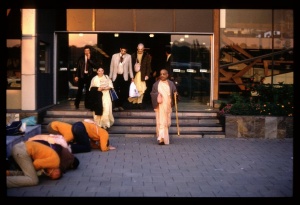SB 1.8.50: Difference between revisions
m (1 revision(s)) |
(Vanibot #0020: VersionCompareLinker - added a link to the Version Compare feature) |
||
| Line 1: | Line 1: | ||
{{info | {{info | ||
|speaker=King | |speaker=King Yudhiṣṭhira | ||
|listener=Lord | |listener=Lord Kṛṣṇa the Supreme Personality of Godhead and assembly | ||
}} | }} | ||
[[Category:Srimad-Bhagavatam - Canto 01 Chapter 08]] | |||
[[Category:Bhagavatam Verses Spoken by Yudhisthira Maharaja - Vanisource|010850]] | |||
<div style="float:left">'''[[Srimad-Bhagavatam]] - [[SB 1|First Canto]] - [[SB 1.8: Prayers by Queen Kunti and Pariksit Saved|Chapter 8: Prayers by Queen Kuntī and Parīkṣit Saved]]'''</div> | |||
<div style="float:right">[[File:Go-previous.png|link=SB 1.8.49]] '''[[SB 1.8.49]] - [[SB 1.8.51]]''' [[File:Go-next.png|link=SB 1.8.51]]</div> | |||
{{CompareVersions|SB|1.8.50|SB 1964|SB 1972-77}} | |||
{{RandomImage}} | |||
==== TEXT 50 ==== | ==== TEXT 50 ==== | ||
<div | <div class="verse"> | ||
naino rājñaḥ prajā-bhartur | :naino rājñaḥ prajā-bhartur | ||
dharma-yuddhe vadho dviṣām | :dharma-yuddhe vadho dviṣām | ||
iti me na tu bodhāya | :iti me na tu bodhāya | ||
kalpate śāsanaṁ vacaḥ | :kalpate śāsanaṁ vacaḥ | ||
</div> | </div> | ||
| Line 17: | Line 23: | ||
==== SYNONYMS ==== | ==== SYNONYMS ==== | ||
<div | <div class="synonyms"> | ||
''na''—never; ''enaḥ''—sins; ''rājñaḥ''—of the king; ''prajā-bhartuḥ''—of one who is engaged in the maintenance of the citizens; ''dharma''—for the right cause; ''yuddhe''—in the fight; ''vadhaḥ''—killing; ''dviṣām''—of the enemies; ''iti''—all these; ''me''—for me; ''na''—never; ''tu''—but; ''bodhāya''—for satisfaction; ''kalpate''—they are meant for administration; ''śāsanam''—injunction; ''vacaḥ''—words of. | |||
</div> | </div> | ||
| Line 24: | Line 30: | ||
==== TRANSLATION ==== | ==== TRANSLATION ==== | ||
<div | <div class="translation"> | ||
There is no sin for a king who kills for the right cause, who is engaged in maintaining his citizens. But this injunction is not applicable to me. | There is no sin for a king who kills for the right cause, who is engaged in maintaining his citizens. But this injunction is not applicable to me. | ||
</div> | </div> | ||
| Line 31: | Line 37: | ||
==== PURPORT ==== | ==== PURPORT ==== | ||
<div | <div class="purport"> | ||
Mahārāja Yudhiṣṭhira thought that although he was not actually involved in the administration of the kingdom, which was being carried on well by Duryodhana without harm to the citizens, he caused the killing of so many living beings only for his personal gain of the kingdom from the hands of Duryodhana. The killing was committed not in the course of administration but for the sake of self-aggrandizement, and as such he thought himself responsible for all the sins. | Mahārāja Yudhiṣṭhira thought that although he was not actually involved in the administration of the kingdom, which was being carried on well by Duryodhana without harm to the citizens, he caused the killing of so many living beings only for his personal gain of the kingdom from the hands of Duryodhana. The killing was committed not in the course of administration but for the sake of self-aggrandizement, and as such he thought himself responsible for all the sins. | ||
</div> | </div> | ||
__NOTOC__ | |||
<div style="float:right; clear:both;">[[File:Go-previous.png|link=SB 1.8.49]] '''[[SB 1.8.49]] - [[SB 1.8.51]]''' [[File:Go-next.png|link=SB 1.8.51]]</div> | |||
__NOTOC__ | |||
__NOEDITSECTION__ | |||
Revision as of 12:16, 25 May 2020

A.C. Bhaktivedanta Swami Prabhupada
TEXT 50
- naino rājñaḥ prajā-bhartur
- dharma-yuddhe vadho dviṣām
- iti me na tu bodhāya
- kalpate śāsanaṁ vacaḥ
SYNONYMS
na—never; enaḥ—sins; rājñaḥ—of the king; prajā-bhartuḥ—of one who is engaged in the maintenance of the citizens; dharma—for the right cause; yuddhe—in the fight; vadhaḥ—killing; dviṣām—of the enemies; iti—all these; me—for me; na—never; tu—but; bodhāya—for satisfaction; kalpate—they are meant for administration; śāsanam—injunction; vacaḥ—words of.
TRANSLATION
There is no sin for a king who kills for the right cause, who is engaged in maintaining his citizens. But this injunction is not applicable to me.
PURPORT
Mahārāja Yudhiṣṭhira thought that although he was not actually involved in the administration of the kingdom, which was being carried on well by Duryodhana without harm to the citizens, he caused the killing of so many living beings only for his personal gain of the kingdom from the hands of Duryodhana. The killing was committed not in the course of administration but for the sake of self-aggrandizement, and as such he thought himself responsible for all the sins.